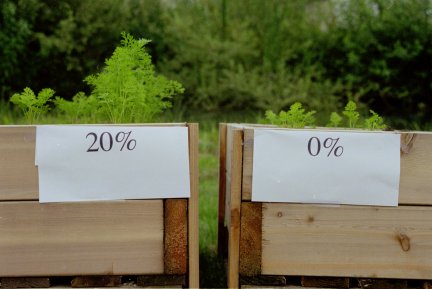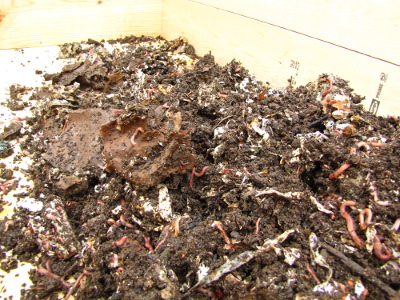
How to use worm castings in the garden
 With
all of the benefits
of worm castings in
mind, you might be tempted to grow your plants in worm
castings alone (if you could somehow come up with that many
castings.) However, some studies suggest that castings may lower
germination rates if they make up more than about a fifth of your
garden soil (perhaps because of a buildup of salts.) In addition,
be aware that the heightened levels of microorganisms in castings
consist nearly entirely of bacteria, so keep the castings in the
vegetable garden rather than feeding them to your fruit trees (who
enjoy a higher fungal to
bacterial ratio in
their soil.)
With
all of the benefits
of worm castings in
mind, you might be tempted to grow your plants in worm
castings alone (if you could somehow come up with that many
castings.) However, some studies suggest that castings may lower
germination rates if they make up more than about a fifth of your
garden soil (perhaps because of a buildup of salts.) In addition,
be aware that the heightened levels of microorganisms in castings
consist nearly entirely of bacteria, so keep the castings in the
vegetable garden rather than feeding them to your fruit trees (who
enjoy a higher fungal to
bacterial ratio in
their soil.)
What about the more
realistic problem of not having enough worm castings to go
around? In that case, it sounds like your best bet is to put just
a bit of worm
castings in each of your garden beds rather than dosing any one bed
heavily. Since even low levels of worm castings can jumpstart
your soil
food web, I wonder if the best use of this limited
resource might not be to activate
biochar?
 However you decide to use
your precious castings, be sure to put them
in the ground when they're fresh. If you allow your castings to
dry
out, to be exposed to sunlight, or just to wait around a few months
before applying them to your garden, many of the positive benefits of
worm castings disappear. Yet another reason to make your own
rather
than trusting a big box store to provide castings for your garden!
However you decide to use
your precious castings, be sure to put them
in the ground when they're fresh. If you allow your castings to
dry
out, to be exposed to sunlight, or just to wait around a few months
before applying them to your garden, many of the positive benefits of
worm castings disappear. Yet another reason to make your own
rather
than trusting a big box store to provide castings for your garden!
| This post is part of our Hands-on Wormkeeping lunchtime series.
Read all of the entries: |
Want more in-depth information? Browse through our books.
Or explore more posts by date or by subject.
About us: Anna Hess and Mark Hamilton spent over a decade living self-sufficiently in the mountains of Virginia before moving north to start over from scratch in the foothills of Ohio. They've experimented with permaculture, no-till gardening, trailersteading, home-based microbusinesses and much more, writing about their adventures in both blogs and books.
Want to be notified when new comments are posted on this page? Click on the RSS button after you add a comment to subscribe to the comment feed, or simply check the box beside "email replies to me" while writing your comment.
